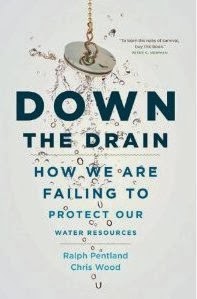

| Visitors Now: | |
| Total Visits: | |
| Total Stories: |

| Story Views | |
| Now: | |
| Last Hour: | |
| Last 24 Hours: | |
| Total: | |
Down the Drain — the review
I picked up this book (amazon.com amazon.ca) in Toronto when I was speaking at a conference on groundwater management in Canada. I was surprised to find that all’s not well for water resources, management or science in Canada.
How is this possible, in the country with the greatest per capita — and huge absolute volumes of — water resources in the world?
- Past abundance has produced a lazy consensus that waste does not matter (Canadians are saved by surplus, not wisdom).
- Many industries (pulp and paper, oil and gas, mining, agriculture) have been given easy access to water to “create” jobs and “develop” remote areas.
- The Conservative government of Stephen Harper (an oil guy from Calgary) is not only indifferent to science, monitoring and management. It’s aggressive in silencing academics (most work at government universities), closing labs and preventing the dissemination of data.
Down the Drain: How We are Failing to Protect Our Water Resources (2013) by Wood and Pentland is a must-read for anyone interested in water issues and policy in Canada. It’s also highly recommended for Americans looking to compare/contrast national and local policies. (Americans will have an easy time with the book because it already compares many policies north and south of the border — as is traditional for Canadians with a World Series perspective.)
I marked lots of pages while reading. Here’s a summary of my notes:
- Water should not be managed for its environmental benefits but its impact on national security. Lose water, and you lose the nation.
- Water use and climate change are drying out lakes; one-in-a-hundred year storms are more frequent.
- Canada had very strong federal laws for protecting water flows and quality. Those laws have been ignored in a rush to delegate authority to provinces that have often traded sustainable water management for short term economic growth (Alberta, BC and others). A 2012 law removed 99 percent of Canada’s inland waterways from federal jurisdiction. Another law threw fisheries under the bus.
- The 1987 McMillan report [pdf] (1987) is the last, best word on water policy. It’s often ignored [pdf], but Environment Canada has an update on pricing water, protecting watersheds, and so on.
- Canada’s decentralized model of water management fails (compared to the EU and US) when the Crown does not step in to reconcile conflicting provincial goals, e.g., BC and AB are exploiting water that the people of the Northwest Territories want to protect (most Canadian rivers flow north).
- Alberta and its old sands have been — and continue to be — a disaster in water abuse and mismanagement.
- Environment Canada is confused and toothless when it comes to punishing abuses. Page 111: “In more than 20 years of CEPA [Canadian Environmental Protect Act] enforcement, Environment Canada has collected a total of $2.4 million in penalties from violators — less than the Toronto Public Library collected from delinquent borrowers in 2009 alone.”
- Canadian industry released more pollution in to waterways than the US industry that serves 10x as many people.
- “Smart regulation” requires that regulations increase GDP-visible economic gains. This is remarkably stupid — or just evil — when costs and benefits to the environment are not even included in GDP calculations.
- Climate change is reducing Canada’s “water income” by 3.5 km^3 per year (as much as they use). The End of Abundance has left the station. When will it arrive in your town?
- Many Canadians, led by Maude Barlow, mistrust “privatization” of water via markets or pricing. The irony of this “sacred belief” is that it prevents policies that could restrain industrial abuse of water and leaves in place ridiculous administrative rules written by industry. Frackers, e.g., pay $1.10 per million liters of water. Canadians get the over-exploited commons they feared.
- Wood and Pentland (journalist, and policy expert, respectively) spend the last two chapters outlining a future of good water policy for Canada. Their main point (as you’ll suspect from these notes) is to restore science, improve information, and set strong policies to protect environmental water flows.
Bottom Line: I give this book FIVE STARS for documenting and analyzing the water governance failure in Canada. Missing science, policies and prices mean that Canada may lose its “national treasure” without knowing why or when, to groups that care more about money, to produce zero benefit for Canadians. Tragic.
Source: http://www.aguanomics.com/2013/11/down-drain-review.html



